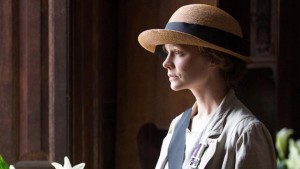Suffragette
Starring: Carey Mulligan, Anne-Marie Duff, Helena Bonham-Carter, Meryl Streep
Directed By: Sarah Gavron
Reviewed by Brendan Dousi
[Rating: 2.5/5]
Already seen Star Wars five times? Not really in an animation mood? How about unnecessary remakes of early 90s films? No? Well, luckily this time of year is abundant with cinematic choices and while most of them fit into the previous categories there are still a precious few out there to appease the more conservative cinema-goer who could do with seeing a movie without explosions. How about a british period-drama dramatising the suffragette movement, aptly named Suffragette? Yeah, this could be more up your alley.
Disclaimer: Suffragette actually does have an explosion.
Maud Watts (Carey Mulligan) has worked in a factory her entire life, as has her mother before her, and her husband Sonny (Ben Wishaw). Suffering in silence from abusive bosses, lower pay-rate and back-breaking hours, it is when Maud gets caught up with feminist ruffian Violet Miller (Anne-Marie Duff) that her life begins to change (for better or worse). Maud finds herself smack-bang in the middle of the Suffragette movement. Now she has to decide whether to keep the status quo, to slave away and appease her husband and raise her son, or to help fight for a potentially brighter future.
By all accounts Suffragette should be one of 2015’s heavy hitters. It’s a period piece focusing on a powerful and important political movement with an abundance of interesting characters and set-pieces to draw from. It should have the power to stir up our innate desire to root for the underdog and get caught up in the whirlwind of these women and their fight for eqality. The problem is, it didn’t. Why not? Because it was dull. That’s the best word I can think of to describe Suffragette. From the cinematography, to the characterization and the lack of energy behind the film’s major set-pieces. It was just, plainly, a dull film.
It is not without it’s merits, of course. The story is innately interesting, despite the way it is told, and there is enough intrigue here to keep your attention. As is inevitable with any adaptation of real events, you of course start to wonder what was real and where the film decides to take it’s ‘creative liberties’. Nothing seems to out of the ordinary here, however, so you can become sucked in to the war-like tactics these women used in their fight for freedom. The performances are obviously great, anyone expecting a bad performance from Carey Mulligan must have a few screws loose, and she does admirably with what she is given. To be fair, she’s given quite a bit but what it is is so dreary that it only contributes to the dull nature of the film. Oh, and Meryl Streep does an admirable not-Margaret-Thatcher for the 1.5 seconds she is in the film.
Still, despite a promising premise, interesting story and solid performances we are left with a slog of a film that is paced like your grandma insisting she doesn’t need help down the stairs, a grim and over-serious outlook that dampens the mood of the film and a colour-palette that’s border-line monochromatic. Something about the way this film was made and put together tends to suck the energy out of you, making a film with a modest 106 minute runtime seem a lot longer. Don’t get me wrong, I love serious films. Even serious films with monochromatic palettes. They just need to have energy and drive to them. They need to break up the dreary depression with some light at least a few times and it couldn’t hurt to try and be a little artistic rather than taking your run-of-the-mill Period setting and dulling that down even further. Instead we just get more of what has been done before, only not done as well.
Suffragette has it’s merits, with great performances and an important story to tell. Unfortuantely, this story is hindered by dull film-making which drags it down to the ‘below average’ echelon of politically-imporant period pieces. I’d like to argue you should see this film because of it’s subject matter, but if you aren’t a fan of British filmmaking at it’s dreariest then I wouldn’t bother.




